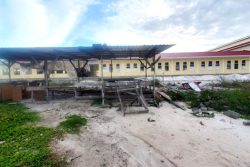Dear Editor,
Cheddi Jagan has at least two types of admirers: some like me, who recognise his essential goodness – his deep humanism, commitment to the working people, openness, friendliness and humour – and believe that his mistakes were made not out of malice but mainly from a misunderstanding of his contextual conditions; and others who not only subscribe to Jagan’s goodness but regard him as a god contrasted with the evil Forbes Burnham. Mr Robert Persaud belongs to the latter group and, I venture to say, sees himself as a high priest of the Cheddi Jagan tabernacle and is betrayed by his rhetoric.
Mr Persaud told us, for example, that: “some men will believe anything to keep you from believing the Bible.” (‘A case of historical revisionism’ SN, August 30). Furthermore, he claimed that I said that all the pre-independence difficulties and post-independence ruin that visited our people were solely the result of Dr Cheddi Jagan and the PPP’s action and policies, whereas what I actually said was: “There is a shared responsibility for what has taken place in this country and … placed in their proper time and condition, both people (Jagan and Burnham) and parties have their flaws and have had their successes.” (‘The traditional PPP historiography is fundamentally flawed’ SN, August 28). Many are astonished that Mr Persaud could, from the reading of my letter, have made such a claim, but a high priest can hardly be expected to acknowledge his deity’s fallibility! The lesson of course is to avoid making gods of those who have dwelt among us.
Defenders of the faith can also be identified by their vilification of the person and the views of the ‘other,’ whose utterings are usually viewed as “unforgivable,” “unhealthy,” “venomous,” intended to “cultivate a false impressions… particularly among the young and… (un)aware individuals,” etc, etc. And we also heard of “extract(s) from the teaching notes of the PNC regime’s ideological school (Kuru-Kuru Cooperative College)” – Cuffy Ideological Institute and not Kuru-Kuru was the PNC ideological school – and of “its erstwhile Principal, Henry Jeffrey … who is a bitter, frustrated political has-been desperately trying to carve out a slot or role in some emerging political construct involving the AFC and company.” Juxtaposed against the facts, it is clear that these are infertile invectives, the offspring of and only likely to impress, stultified minds.
Since presentations of this kind are intended to appeal to the emotions and not the mind, they are normally short on facts. Thus, utilising about ten per cent of his presentation, Mr Persaud wrote: “There is much historical evidence, revelations and impartial accounts of what transpired to debunk such contemptuous conclusions. Available in the public domain the public can today determine who or what engineered the split in the PPP, spawned and nurtured ethnic distrust, calculatedly forced into exile thousands, introduced policies that marginalised and discriminated against sections of the Guyanese public and made Guyana and all Guyanese impoverished.” As is obvious, interpretations of much of this “historical evidence, revelations and impartial accounts” remain mired in controversy, and I have already conceded some of those contentions. What the above quote fails to tell us is why? Why did these things happen? Was it simply the innate wickedness of international and local capital, the churches, the UF, the PNC and of course, the evil genius Forbes Burnham? I think not, and that we should look elsewhere for the explanation. “In Washington, some American political leaders were already (1961) describing Dr Jagan as a communist, and they were worried that even though he was the most popular Guyanese leader he would not follow the democratic path. As such, the US administration had already implemented plans to undermine the PPP Government, even though the British Government had insisted that Dr. Jagan was a more responsible leader than Forbes Burnham” (www.guyana.org/features). This US view of Jagan and the PPP was only changed after the demise of world communism in the late 1980s.
Both Burnham and Jagan must take some responsibility for what has taken place in our past; perhaps the former more than the latter as he was sufficiently strategically placed to prevent himself from making mistakes similar to those of Jagan. From being the beneficiary of Jagan’s failure to adequately judge his environment, by the time of his death the regional juggernaut was at Burnham’s door! We can moralise as much as we like about national sovereignty, the rights of people to choose their own leaders, etc, but as a national leader one must recognise the extant global and regional realities and appreciate one’s limitations. Not to properly do so is to court personal and collective ruination. We sometimes forget that Jagan and Burnham were very young and inexperienced in the 1950s.
In my view, neither Burnham nor Jagan properly appreciated the bi-communal nature of our society; indeed some of us still do not, and if we are looking for a culprit, here it is. Think of it: twenty-eight years after the PNC’s destructive rule of Guyana, in 1992 the vast majority of African-Guyanese still voted for that party, and the vast majority of Indian-Guyanese, who are normally thought the most entrepreneurial/capitalistic of our people, continuously voted for Cheddi Jagan, the declared communist! I believe that at the base of this is ethnic insecurity, which must finally be effectively addressed in new constitutional arrangements if this country is to sensibly progress.
Yours faithfully,
Henry B Jeffrey







